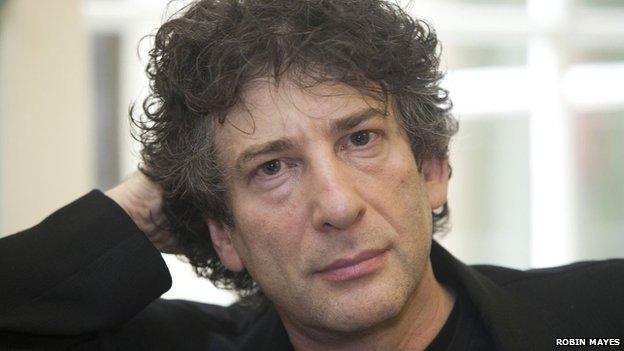Neil Gaiman: 'No such thing as a bad book for children'
- Published

Fantasy author Neil Gaiman has said "snobbery and foolishness" by adults about certain books can easily destroy a child's love of reading.
"I don't think there is such a thing as a bad book for children," Gaiman said on Monday night in a speech to leading figures from the arts, education and literary world.
The author, best known for novels including American Gods, Coraline and The Graveyard Book, was delivering the second annual Reading Agency, external lecture at the Barbican in central London.
"Every now and again it becomes fashionable among some adults to point at a subset of children's books, a genre, perhaps, or an author, and to declare them bad books, books that children should be stopped from reading," Gaiman said.
"I've seen it happen over and over; Enid Blyton was declared a bad author, so was RL Stine, so were dozens of others. Comics have been decried as fostering illiteracy.
"It's tosh. It's snobbery and it's foolishness.
"There are no bad authors for children, that children like and want to read and seek out, because every child is different. They can find the stories they need to, and they bring themselves to stories.
"A hackneyed, worn-out idea isn't hackneyed and worn out to them. This is the first time the child has encountered it. Do not discourage children from reading because you feel they are reading the wrong thing. Fiction you do not like is the gateway drug to other books you may prefer. And not everyone has the same taste as you.
"Well-meaning adults can easily destroy a child's love of reading: stop them reading what they enjoy, or give them worthy-but-dull books that you like, the 21st Century equivalents of Victorian 'improving' literature. You'll wind up with a generation convinced that reading is uncool and worse, unpleasant."
'Badge of honour'
Gaiman's speech comes a few days after his 1996 fantasy novel Neverwhere was removed from the reading list of a high school in New Mexico, external after the mother of one of the school's students complained that it was "inappropriate" for teenagers.
Gaiman said he had found it "incredibly heartening" that some of the school's teachers had publicly supported him.
"Books get challenged," he told the BBC on Monday afternoon before he delivered his lecture. "I tend to take books of mine being challenged and occasionally being banned - and very occasionally being burned - as a kind of badge of honour. You know you are doing something right."
He added: "And in Alamogordo, New Mexico, you know that... those kids are going to be really desperate to get their hands on Neverwhere, and I want to apologise to them all because there really aren't lashings of sex and violence."
In his speech, Gaiman said he worried that people "misunderstand what libraries are" in the 21st Century.
"If you perceive a library as a shelf of books, it may seem antiquated or outdated in a world in which most, but not all, books in print exist digitally. But that is to fundamentally miss the point. I think it has to do with nature of information."
He added: "For all of human history, we have lived in a time of information scarcity, and having the needed information was always important, and always worth something: when to plant crops, where to find things, maps and histories and stories...
"Information was a valuable thing, and those who had it or could obtain it could charge for that service.
"In the last few years, we've moved from an information-scarce economy to one driven by an information glut."
He quoted Google's executive chairman Eric Schmidt as saying that every two days now the human race creates as much information as we did from the dawn of civilisation until 2003.
Gaiman said librarians were there to "help these people navigate that world".
The English author, who was born in Hampshire and is now based in the US, said he did not believe that all books would migrate on to screens.
"As Douglas Adams once pointed out to me, over 20 years before the Kindle turned up, a physical book is like a shark.
"Sharks are old: there were sharks in the ocean before the dinosaurs. And the reason there are still sharks around is that sharks are better at being sharks than anything else is."
Speaking at a press briefing ahead of his speech, Gaiman said the consequences of not funding and of closing down libraries were "insidious and slow".
"It's the equivalent of stopping vaccination programmes... you know what the results are," he said.
Gaiman's most recent books include The Ocean at the End of the Lane and children's book Fortunately, the Milk. He has also written two episodes of the BBC TV show Doctor Who.
- Published17 June 2013
- Published15 March 2013
- Published24 May 2010